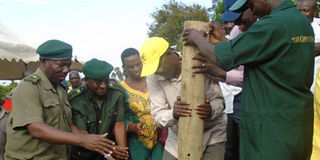UWA installs electric fence around national game parks

Prospects. Tourism minister Ephraim Kamuntu (3rd right) launches the electric fencing system in Kyenzaza II Village, Kirungu Sub-county in Rubirizi District on Saturday. PHOTO BY ENID NINSIIMA
What you need to know:
- Background. The move follows several complaints by residents losing their crops and lives to wild animals from game parks.
- Prof Ephraim Kamuntu, the minister for Tourism, said government is committed to maintaining good animal-human relations and urged the residents to stop poaching.
Rubirizi. The Uganda Wildlife Authority (UWA) has embarked on a pilot project to install electric fences around national parks in a bid to stop animals from straying into neighbouring communities.
A 10-km solar-powered electric wire fence is being piloted in Kyenzaza II Village, Kirugu Sub-county in Rubirizi District following several complaints by residents losing their crops and lives to wild animals from Queen Elizabeth National Park.
President Museveni promised the electric wire fence to residents of Kasese and Rubirizi districts during the 2011 presidential campaigns.
Speaking at the launch on Saturday, Mr George Owoyesigire, who represented the UWA executive director, Mr Sam Mwandha, said the project is being piloted in Kyenzaza with 19kms stretch and there after, 9kms will be added before crossing to Muhokya for 30kms, all in Queen Elizabeth conservation area, and 10kms in Murchison Falls National Park.
“Electric fencing is an expensive venture; we shall spend $6,000 [ about Shs22 million] per kilometre, and we import all the materials from Kenya. Residents must guard the project jealously if it is to help them. It takes us three months to bring materials from Kenya to Uganda,” Mr Owoyesigire said.
He said the solar electric fencing is more effective than trenches, cages, beehives and planting thorny plants on the park boundary.
“Our major challenges are in Queen Elizabeth National Park and if we can solve the elephant invasion, UWA will have achieved 90 per cent of the problems and the 10 per cent goes to [controlling] other animals,” he noted.
Prof Ephraim Kamuntu, the minister for Tourism, said government is committed to maintaining good animal-human relations and urged the residents to stop poaching.
“Government will do what it takes to conserve nature for the country however expensive it may be,” he said. “However, I want you to embrace economic transformation for development. Otherwise you will keep poaching our animals and government will catch you,” Prof Kamuntu added.
Residents expressed mixed feelings towards the electric fence. “... I am not happy because the project will only target the big animals such as elephants and yet we have other animals such as baboons, monkeys, hippos among others that destroy our crops. What they have done is just a drop in the ocean,” said Ms Angela Birungi, a resident.



